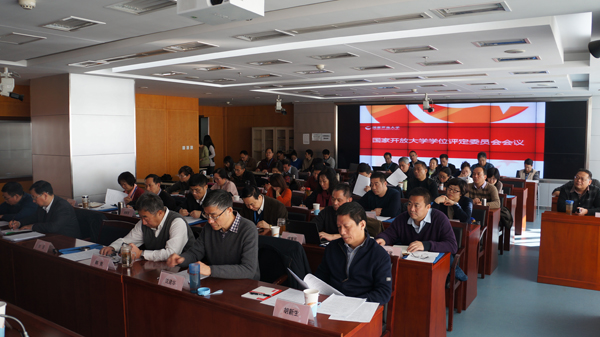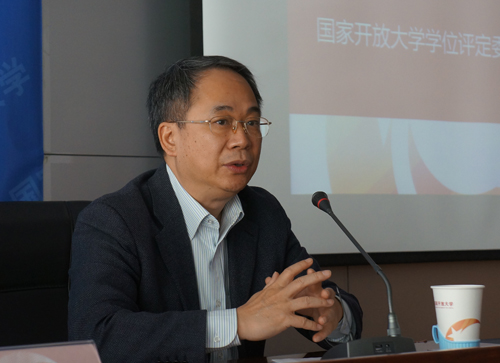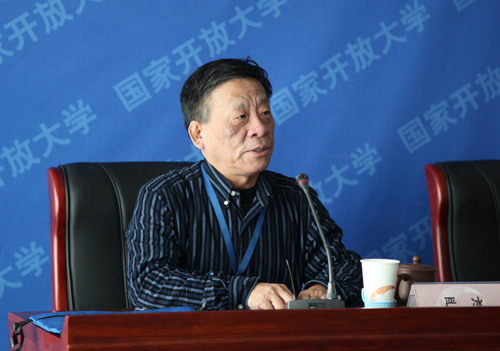 The OUC Academic Degree Evaluation Committee met in Beijing on December 2-3, 2015. It was the first plenary meeting since the OUC Academic Degree Evaluation Committee was founded in September 2013, and also the first academic degree granting working conference since the OUC was authorized to grant bachelor degrees.
The OUC Academic Degree Evaluation Committee met in Beijing on December 2-3, 2015. It was the first plenary meeting since the OUC Academic Degree Evaluation Committee was founded in September 2013, and also the first academic degree granting working conference since the OUC was authorized to grant bachelor degrees.
The meeting’s theme encompassed systems related to the OUC granting academic degrees; issues in degree granting in relevant subjects, such as Law, Chinese Language and Literature, Accounting, Business Administration, and Computer Science and Technology, as well as issues with granting other undergraduate degree programmes.
 OUC’s President Yang Zhijian, 40 Academic Degree Evaluation Committee members from the OUC and its 19 branches, and heads of each teaching and academic affairs department attended the meeting. Yan Bing, the OUC’s Vice President and Director of the OUC Academic Degree Evaluation Committee, presided over the meeting.
OUC’s President Yang Zhijian, 40 Academic Degree Evaluation Committee members from the OUC and its 19 branches, and heads of each teaching and academic affairs department attended the meeting. Yan Bing, the OUC’s Vice President and Director of the OUC Academic Degree Evaluation Committee, presided over the meeting.
 Yang Zhijian pointed out that the CCRTVU is tirelessly pursuing the authority to grant academic degrees and, moreover, obtaining that authority is an important milestone in the OUC's reform and development. That authority significantly enhances promoting the reform of learner development modes and international cooperation. He said that "openness" is one of the OUC’s operating philosophies. Adhering to that philosophy, the OUC forms a common platform where all institutions participating in the construction of the OUC gather together, with each branch, school, department, and study centre of the OUC establishing a community or an alliance to jointly develop the platform. Under this guiding philosophy, the OUC's Quality Assurance, Academic Degree Evaluation, and Academic committees, founded in 2013, consist of members from the school’s operating system. Through agencies, they negotiate and address relevant issues of the OUC. The OUC arranges its work into two segments, the OUC headquarters and its branches. The headquarters manage national affairs, while branches are responsible for their respective regions. Recently, focus has shifted to the branches, with the branches serving as the main force. In the future, the OUC will focus on utilizing the power of the entire educational system, fully employing each branch and jointly promoting additional subjects to be granted academic degrees.
Yang Zhijian pointed out that the CCRTVU is tirelessly pursuing the authority to grant academic degrees and, moreover, obtaining that authority is an important milestone in the OUC's reform and development. That authority significantly enhances promoting the reform of learner development modes and international cooperation. He said that "openness" is one of the OUC’s operating philosophies. Adhering to that philosophy, the OUC forms a common platform where all institutions participating in the construction of the OUC gather together, with each branch, school, department, and study centre of the OUC establishing a community or an alliance to jointly develop the platform. Under this guiding philosophy, the OUC's Quality Assurance, Academic Degree Evaluation, and Academic committees, founded in 2013, consist of members from the school’s operating system. Through agencies, they negotiate and address relevant issues of the OUC. The OUC arranges its work into two segments, the OUC headquarters and its branches. The headquarters manage national affairs, while branches are responsible for their respective regions. Recently, focus has shifted to the branches, with the branches serving as the main force. In the future, the OUC will focus on utilizing the power of the entire educational system, fully employing each branch and jointly promoting additional subjects to be granted academic degrees.
He stressed that degree-granting must focus on quality, combining the degree-granting work with education and teaching reform. Through granting degrees, the OUC aims to enhance the level of discipline development, lay a foundation for future postgraduate programmes, and constantly improve the level and quality of learner development.
The Director of OUC’s Academic Affairs Department, Kuang Guiqiu, introduced issues in granting degrees that exist between the OUC and cooperating regular colleges and universities, the procedures for applying to grant degrees, and the basics in carrying out the follow-up work in granting degrees. Deputy Director of OUC’s Academic Affairs Department Sun Hongfei reported on the process of drafting systems for the OUC's degree-granting programme and their main contents.
Participating members discussed four documents regarding the rules of the OUC's degree-granting, explored working thoughts on follow-up work, and considered matters related to applying degree-granting in other disciplines.
 In summarizing the meeting, Yan Bing pointed out that the work of degree-granting is an important part of the OUC’s overall transformation. The OUC should take this opportunity to deepen reform and accelerate construction of the school. He argued that the OUC should adhere to the concepts of "shifting focus from the OUC headquarters to its branches" and "providing individual guidance," as well as modify and print two rule sets as soon as possible, both the OUC's Rules of Academic Degree Evaluation Committee and Detailed Implementation Rules of the OUC's Degree-Granting. He stressed that the OUC should grant degrees in five disciplines, explore relevant problems, put forward measures to deal with the corresponding problems, make preparatory plans, and prepare risk prevention and control. Other undergraduate disciplines will begin to grant degrees under a guiding policy of "comprehensively launching, applying in batches, properly arranging the application process, and pragmatically implementing" to quickly launch the application of granting degrees. Meanwhile, the application of granting degrees shall be combined with discipline development, deepening teaching reforms, and enhancing the quality of each discipline.
In summarizing the meeting, Yan Bing pointed out that the work of degree-granting is an important part of the OUC’s overall transformation. The OUC should take this opportunity to deepen reform and accelerate construction of the school. He argued that the OUC should adhere to the concepts of "shifting focus from the OUC headquarters to its branches" and "providing individual guidance," as well as modify and print two rule sets as soon as possible, both the OUC's Rules of Academic Degree Evaluation Committee and Detailed Implementation Rules of the OUC's Degree-Granting. He stressed that the OUC should grant degrees in five disciplines, explore relevant problems, put forward measures to deal with the corresponding problems, make preparatory plans, and prepare risk prevention and control. Other undergraduate disciplines will begin to grant degrees under a guiding policy of "comprehensively launching, applying in batches, properly arranging the application process, and pragmatically implementing" to quickly launch the application of granting degrees. Meanwhile, the application of granting degrees shall be combined with discipline development, deepening teaching reforms, and enhancing the quality of each discipline.
By Liu Hui, OUC